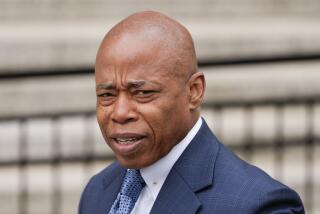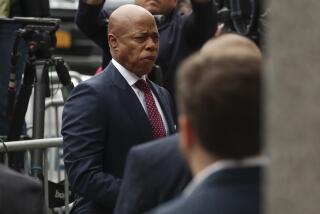Unaware of Key Role by North, Abrams Asserts : Told of ‘Big Network,’ However, Official Says
- Share via
WASHINGTON — Assistant Secretary of State Elliott Abrams told congressional committees Tuesday that former White House aide Lt. Col. Oliver L. North once told him about “a big network” of private firms and bank accounts that aided Nicaragua’s rebels, but he insisted that he never suspected it was run by North or anyone else in the Administration.
Committee members voiced sharp doubts, particularly after Abrams acknowledged that he had previously made false statements to the public, Congress, Secretary of State George P. Shultz and the news media.
Sen. Howell Heflin (D-Ala.) told Abrams that his testimony suggested “there’s something about your relationship with Oliver North that you want to hide.” And Rep. Jack Brooks (D-Tex.) later referred to Abrams as “a lying son of a bitch” during a break in the hearings.
Knowingly Lied
Abrams, the highest-ranking current Reagan Administration official yet implicated in the Iran- contra scandal, previously had acknowledged that he solicited $10 million for the contras from the Sultan of Brunei and knowingly lied to the Senate Intelligence Committee about it last November. He had also admitted making speeches to raise money for the private contra supply network.
Abrams stoutly maintained that he did nothing illegal and insisted that his previous false statements had been justified by diplomatic considerations. His account of several important events in the drama contradicted earlier testimony by several committee witnesses, including former U.S. Ambassador to Costa Rica Lewis A. Tambs, retired Army Gen. John K. Singlaub and Joe Fernandez, the former CIA station chief in Costa Rica.
As chairman of an interagency group that oversees Central American policy, Abrams said he was aware that North--also a group member--knew more than anyone else in the Administration about the supposedly private network that was supplying the contras during much of 1985 and 1986, when both direct and indirect U.S. military assistance was barred by Congress.
“I knew he knew more about it than we in the department did, and that he seemed to know more about it than CIA did,” Abrams said. “He told me once, for example, that there was a big network out there of people and companies and bank accounts, which nobody else ever said to me.”
But he insisted that he never questioned whether North was actually running the operation from the White House--not even after he was questioned about it by Congress and the news media when a plane carrying weapons to the contras was shot down over Nicaragua on Oct. 5, 1986. The lone survivor of that flight was Eugene Hasenfus.
‘Monitoring’ Activities
Abrams said he assumed that North was doing nothing more than “monitoring” the activities of private donors such as Singlaub, who shipped $5-million worth of weapons to the contras.
“I assumed that there was not one Gen. Singlaub, but rather that there were a number of what you might call Singlaub-type operations . . . and that the person who knew most about all of those efforts was Col. North,” he said.
Committee members clearly were unconvinced by Abrams’ professed lack of curiosity about North’s role, especially since the two men conferred almost daily about the contras and he testified that he was under orders from Shultz to “monitor Ollie,” who was widely viewed at the State Department as a “loose cannon.”
‘Inquire No Evil’
Although Abrams joked that “monitoring Ollie is not an activity that you do one morning,” Heflin charged that he had intentionally avoided asking North any questions. “When it came to Col. North,” Heflin said, “you could see no evil, hear no evil, speak no evil, inquire no evil.”
Abrams acknowledged that he purposely did not ask more questions. “I was careful not to ask Col. North questions that I did not need to know the answers to,” he said.
But he insisted that he had good reason to believe North was not involved in running the contra supply network, especially since North had assured him that he was doing nothing illegal. He said North told him more than once: “I never solicited a nickel. I am not breaking the law. I have checked with White House counsel.”
In addition, Abrams said he was reassured by the categorical denials of former White House National Security Adviser Robert C. McFarlane that the Reagan Administration was circumventing the congressional ban on U.S. military assistance to the contras.
In mounting his own defense, Abrams departed from the Administration’s contention that North, as a member of the National Security Council staff, could not violate the congressional ban, authored by Rep. Edward P. Boland (D-Mass.), which applied only to government intelligence agencies and not to the NSC.
Abrams, when asked one of North’s schemes to raise money for arms, responded: “Oh, God! It’s an absolute, direct violation of the Boland amendment.”
He testified that he did not know that the Administration was violating the ban authored by Boland until Oct. 23, 1986, when he was told by the chief of the CIA’s Latin American division that there was evidence that an agency official had assisted in the airdrop of military supplies to the contras over Nicaragua.
Called ‘Bum Rap’
Although Abrams described as “a bum rap” the characterization of North as a loose cannon, he recalled that the former White House aide once proposed a military plan for the contras that was quickly dismissed by the Defense Department and CIA as “the craziest idea we ever heard.” He said North patterned it on the battle of Khe Sanh in Vietnam.
“The idea was that the resistance would take a location on the Atlantic Coast of Nicaragua . . . a town or a city . . . and that one of two things would be bound to happen,” Abrams said. “Either seeing these freedom fighters killed day by day, we would rescue them, or seeing them fighting to the last man--kind of an Alamo-style fight--the public perception of their bravery would change.”
Attorneys for the House and Senate committees spent several hours asking Abrams about the false or misleading statements he had made to various congressional panels.
Money Lost on the Way
Although Abrams had personally solicited a $10-million contribution from Brunei in early August, 1986, he told the Senate Foreign Relations Committee on Oct. 10 that he did not know whether the contras had received money from any foreign government. Abrams justified his answer by noting that the contribution he had solicited from Brunei had gotten lost on its way to a Swiss bank account and thus never actually reached the rebels.
Four days later, Abrams gave essentially the same account to the House Intelligence Committee when asked: “Do you know if any foreign government is helping to support the contras?”
Then on Nov. 25, Abrams deflected questions from the Senate Intelligence Committee with the assurance: “We’re not in the fund-raising business.”
“Unless the senators asked you exactly the right question, using exactly the right words, they weren’t going to get the right answer. Wasn’t that the approach?” asked Mark A. Belnick, assistant to the Senate counsel.
‘Lacked Authority’
“That’s exactly a correct description of what I did on that day because I thought--I feel still--that I lacked authority on that day to reveal that (Brunei) solicitation, and the method of refusing to reveal it . . . was to ask for the narrowly drawn question,” conceded Abrams, who later apologized to the Intelligence Committee.
Separately, Abrams admitted that he had misled the House Foreign Affairs Committee on Oct. 15 on the extent of government involvement in the contra supply effort, but he insisted that he did it unintentionally because he did not know the truth.
“Every one of these statements was completely honest and completely wrong,” he said.
Disputes Testimony
Abrams frequently disputed testimony of earlier witnesses and evidence compiled by the committee that suggested he had more knowledge of the contra resupply network than he has admitted. Among other things, he said that:
--He refused to assist Singlaub in soliciting money for the contras from Taiwan and South Korea, even though the committee produced a memo written by Richard H. Melton, his assistant for Central America, referring to “the earlier decision” to do so.
“The memorandum is in error,” Abrams declared.
--While he gave speeches for the National Endowment for the Preservation of Liberty, headed by Carl (Spitz) Channell, he was unaware that the group was illegally collecting tax-exempt donations to buy weapons for the contras.
He dismissed as “sales puff” a memo in which Channell claimed to be working closely with Abrams.
--He did not know until Tambs decided to resign last year that the ambassador to Costa Rica had been under orders from North to help open a southern resistance front in Nicaragua. Tambs testified that he had a hallway conversation with Abrams at a meeting in Panama in September, 1985, which demonstrated that “he knew as much about it as I did.”
Called ‘Bizarre’
“I think it is bizarre to think that we discussed any such thing in a corridor or anywhere else,” Abrams said.
--Although he learned in August, 1985, about the construction of an airstrip in Costa Rica to assist the contra resupply network, he saw nothing wrong with it because he knew of no involvement by the U.S. or Costa Rican governments.
“Private benefactors were sending a whole lot of things to Central America,” he said. “Surprise, surprise.”
--In September, 1986, he and North asked Tambs to telephone Costa Rican President Oscar Arias Sanchez “with an implied threat” that his upcoming official trip to Washington would be “complicated” if a Costa Rican official exposed the existence of the airstrip at a press conference.
But he insisted that his intent was not to cover up the U.S. government link to the airstrip, which he did not know about. “What was important was that this press conference was going to complicate U.S.-Costa Rican relations,” he said.
More to Read
Get the L.A. Times Politics newsletter
Deeply reported insights into legislation, politics and policy from Sacramento, Washington and beyond. In your inbox twice per week.
You may occasionally receive promotional content from the Los Angeles Times.










